On the evening of April 27, 2013, security guards shot protesters outside a silver mine in Guatemala, wounding several. The head of security at the time, Alberto Rotondo, faces criminal charges in Guatemala for ordering the attack but fled the country. The seven men attacked have launched a civil suit in the Supreme Court of British Columbia against the mine owner, Tahoe Resources of Vancouver.
In the context of community divided by support for and opposition to the Escobal mine project, many people have faced acts of violence, intimidation and repression. This includes two mine security people, killed by unknown attackers prior to the April shooting.
The next year, 16-year-old Topacio Reynoso and her father Alex Reynoso were attacked by unknown gunmen on the evening of April 13, 2014, on their way home from a festival. Topacio Reynoso did not survive the bullet wounds, her father did. It is not known if the attack is related to the family’s activism against the Tahoe mine, because there was no investigation to resolve the crime and bring justice to Reynoso’s family.[iv] The father and daughter had helped organize referendums in July and August 2013 in which more than 23 000 voters rejecting the Escobal project – 98% of the votes.[v]
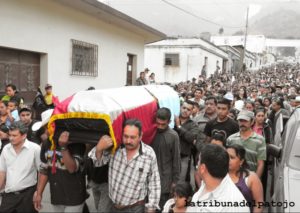
Thousands filled the streets of Mataquescuintla at the funeral of Topacio Reynoso, the 16-year-old who was murdered. Photo: Jose Pablo Chumi
With regard to the civil suit, MiningWatch Canada’s Latin America co-ordinator, Jen Moore, says that the court agreed that “British Columbia is the best jurisdiction for this case to be heard giving that there is a tremendous chance of injustice should it be sent back to Guatemala. And now that the Supreme Court of Canada has denied Tahoe an appeal, the case is clear to proceed toward actual trial”.[vi]
For its part, Tahoe’s 2016 Sustainability Report states that the mining company has a mission to responsibly operate its mines under international standards,[vii] and that the company applies those standards with its own rules and protocols. Tahoe fired Rotondo after the incident, saying he had disregarded its protocols and direct orders.[viii]
Rafael Maldonado, the Legal Director for Centro de Acción Legal, Ambiental y Social de Guatemala (CALAS), provides legal representation and advice to several communities affected by the exploitation of natural resources. He has received several threats and actions of violence. For example, on the night of April 3th, 2017, unidentified people fired several shots at a car located in front of Maldonado’s house in Guatemala City.[ix]
I discussed the incidents of violence with Shin Imai, a lawyer who was very eager to discuss the situation for this article. He is with the Justice and Corporate Accountability Project (JCAP), a community- based legal clinic that offers legal support to communities that are affected by resource extraction.[x]
Shin Imai was energetic as he spoke. “Are you surprised that no one was charged? In Guatemala there are obviously problems with police corruption, corruption of the politicians, and so it’s not a country where we can find out the truth. So maybe this is a situation where we need to get somebody from Canada to investigate what happened, and whether there is a connection to Tahoe Resources. ”
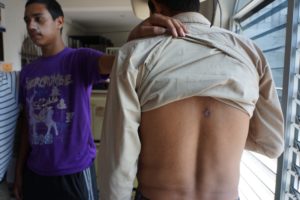
Luis Fernando Garcia (left) and father Adolfo Augustin Garcia. Tahoe private security shoot at a group of men participating in a peaceful protest outside the mine entrance. Tahoe claimed that only rubber bullets were used, but seven men were injured by what they allege to include lead bullets. Photo: Giles Clarke
To understand how the mine affects the local Xinca indigenous community, I contacted Kelvin Jiminez, legal adviser to the Parliament of the Xinca People of Guatemala, a recent political development. In 2002, nine Xinca communities organized the Consenso por la Unidad del Pueblo Xinca de Guatemala (CONXIG) with the support of the Norwegian International Development Agency and the United Nations Verification Mission for Guatemala. Then the CONXIG became Parlamento del Pueblo Xinca de Guatemala, the first indigenous parliament in Guatemala.[xi]
Despite a bad phone connection, Jiminez granted me an interview about the impact on the territory. “There is no respect for the right to self-determination and the repeated expressions of opposition to the project,” he said. “The Xinca community have trust issues after all the confrontation, which makes it hard to establish a table of dialogue with Tahoe Resources and the government. There is no evolution, no actions or answers from the government since 2013. ”
This leads us to questions of legality. The lack of consultation with the Xinca people is against international standards, according to a UN report of July 2013. “Regardless of whether or not the consent of indigenous peoples is a strict imperative in particular cases, States should ensure that consultations are undertaken, in good faith, with indigenous peoples regarding extractive activities likely to affect them, and make efforts to obtain their consent, as required by the United Nations Declaration on the Rights of Indigenous Peoples (articles 19 and 32 (2), ILO Convention No. 169 (art. 6.2)”. [xii]
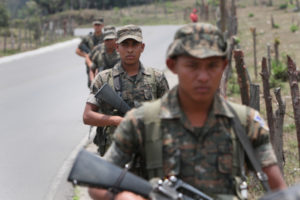
Military patrol near a checkpoint during the state of siege in May 2013. Photo: James Rodriguez
Jenny Amalia Lemus is an organizer with the Diocese Council for the Defense of Nature (CODIDENA), a Guatemalan NGO organizing conferences and political events.[xiii] Despite her very busy schedule, Lemus took time to give me her perspective. “We are a team of four people for seven municipalities. The resistance is still happening and the government and the mining companies will never take responsibility. Right now there are studies that show the presence of arsenic and other metals in the water of San Rafael Las Flores, at the same time the drying of springs and the social division will not be fixed.”
The government has long been a supporter of the mine operation. In May 2013, Guatemalan President Otto Pérez Molina declared a military “state of siege” in the area for one month, and deployed thousands of police and military personnel. The state of siege served to guarantee the stability of the operating mining project by suspending constitutional rights including freedom of movement, freedom of assembly and protest, and rights of detainees and prisoners.[xiv]
Tara Scurr, a human rights campaigner with Amnesty International Canada, took time from recovering from a bad cold to tell me her perspective. “It’s really that they’ve broken the trust in the community. I mean, people lived through a state of siege with thousands of troops in the community. People’s families were deeply traumatized when the military and the police burst into their homes looking for their dads or their moms who had to go hiding, and not knowing if they’re going to see their parents again. People blame the company because before the company was there that wouldn’t necessarily have happened in a lot of people’s minds.”
Earthworks is an environmental group in Washington DC. Ellen Moore is its International Mining Coordinator, and she worked on the Escobal mine project in Guatemala for several years. Despite her busy schedule and jet lag, Moore was passionate when sharing her perspective.
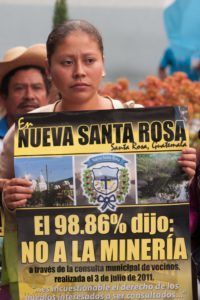
Anti-mine protest
“People have experienced problems with traffic, with dust, noise pollution and light pollution. And then recently, in the last year, there’ve been impacts on houses from underground explosions. That is very difficult for the communities with limited resources to be able to prove scientifically in a way that would force Tahoe to take responsibility. The government and company say that it’s not a result of their operations and not the company’s responsibility. And then communities are left with not a lot of options.”
For its part, since 2014 Tahoe has moved to strengthen its policies to align with Equator Principles, the UN Guiding Principles on Business and Human Rights, and the World Bank’s International Finance Corporation’s Performance Standards.[xv] Even so, President and CEO of Tahoe Resources Ron Clayton, in response to the suspension of the company’s licence in mid-2017, said, “We are extremely disappointed in the Court’s ruling suspending the license because we believe that there are no indigenous communities affected by Escobal’s operations”.
Now the company says that it is improving its social responsibility standards, by developing new comprehensive policies on indigenous peoples and corporate social responsibility.[xvi]
“We understand the importance of respecting the indigenous individuals and communities in the areas in and around our operations,” said Tahoe’s Ron Clayton, in a February 2018 press release. “In conjunction with formalizing an Indigenous Peoples Policy, we are working to take a more proactive approach to improving key relationships with indigenous peoples near our operations.”
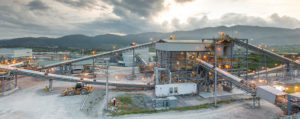
The Escobal mine. Photo: Tahoe Resources
“It is in this spirit that Tahoe wishes to clarify and specifically acknowledge the presence and importance of the indigenous peoples located in the communities near Escobal, particularly the Xinca,” he said. “We are focused on finding a way to work constructively with the Xinca communities and other indigenous groups across the region. Tahoe respects the rights, customs and cultural heritage of all indigenous peoples, and we are committed to engagement and dialogue in all regions of our operations for the mutual benefit of everyone.” [xvii]
The Basic Principles on the Use of Force and Firearms by Law Enforcement Officials, adopted in 1990 by the United Nations Congress on Crime Prevention and Criminal Justice[i] set standards that would also apply to private security. For example, principle 5 (b) states, “Whenever the lawful use of force and firearms in unavoidable, law enforcement officials shall: Minimize damage and injury, and respect and preserve human life”.[ii]
The UN Special Rapporteur on the rights of indigenous peoples, in his report to the Human Rights Council of July 1, 2013, stated that “extractive companies should adopt policies and practices to ensure that security personnel employed by them act in accordance with relevant human rights standards and with sensitivity to indigenous cultural and social patterns.”[iii].
[i] http://www.ohchr.org/EN/ProfessionalInterest/Pages/UseOfForceAndFirearms.aspx
[ii] http://www.ohchr.org/EN/ProfessionalInterest/Pages/UseOfForceAndFirearms.aspx
[iii] https://sogip.files.wordpress.com/2013/09/a-hrc-24-41_fr.pdf, p.8
[iv] https://tahoeontrial.net/2015/10/22/shooting-attack-in-mataquescuintla-jalapa-against-opponents-of-tahoe-resources-escobal-mine/
[v] Gina and Ellen from Earthworksactions
[vi] Interview, March 2018
[vii] Tahoe resources sustainability report 2016, p.6
[viii] http://www.cbc.ca/news/canada/british-columbia/tahoe-resources-vancouver-mining-firm-in-court-today-over-guatemalan-workers-lawsuit-1.3024121
[ix] https://www.amnesty.ca/sites/amnesty/files/85%20Guatemala_1.pdf
[x] https://justice-project.org
[xi] https://en.wikipedia.org/wiki/Xinca_people
[xii] https://sogip.files.wordpress.com/2013/09/a-hrc-24-41_fr.pdf”
[xiii] http://nisgua.blogspot.ca/2015/10/three-things-you-can-do-to-halt-tahoe.html
[xiv] http://upsidedownworld.org/archives/guatemala/state-of-siege-mining-conflict-escalates-in-guatemala/
[xv] http://www.ilo.org/dyn/normlex/en/f?p=NORMLEXPUB:12100:0::NO::P12100_ILO_CODE:C169
[xvi] http://www.miningweekly.com/article/tahoe-burnishes-csr-profile-in-undertaking-to-develop-indigenous-peoples-policy-2018-02-14/rep_id:3650
[xvii] http://www.tahoeresources.com/tahoe-to-develop-comprehensive-indigenous-peoples-policy-in-2018/
Meryem Zanfi
Meryem Zanfi is a graduate in International Studies and specializes in Law and Governance at the Université de Montréal. She also obtained a certificate in social and labour law from the Université du Québec à Montréal. Knowing that the defense of human rights is at the heart of her projects, she is pursuing a master’s degree in international law.

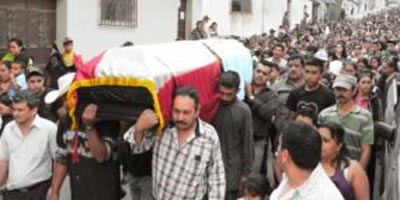



Gilles Surprenant
All people and societies have a right to protection of law and order, but it is shameful (1) for companies and governments to hide behind the authority of law and order to deprive citizens of their right to protest against unhealthy by products of mining or (2) for mining companies to avoid the extra cost of assuring safety and environment protection practices or (3) for governments to allow companies to pollute the environment or otherwise to act against the health and rights of the people. We all share responsibility for one another’s well being and for the environment because we all live in “the same house” which is our natural environment.